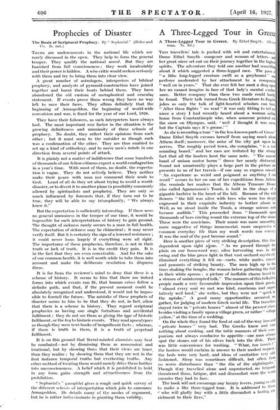A Three-Legged Tour in Greece A Three-Legged Tour in Greece.
By Ethel Smyth. (tbi,,
• 'man. • Is. dd.) • '
Tars travellers' talc is packed with wit and entertaininuw, Dame Ethel Smyth—composer and woman of letters—and her great niece set out on their journey together in the high spirits. The adventure they told one another had someth4 about it which suggested a three-legged race. The pace of " a lithe long-legged creature swift as a greyhound was perforce moderated by her attachment to a companion " well on in years." That she ever felt her aunt a drag upon her we cannot imagine in face of that lady's mental miter. once. Better company than these two made could hank be found. Their talk turned from Greek literature to English jokes as only the talk of .light-hearted scholars can turn. " After these flights " we read " it was only fitting to tell sir niece a story I had recently heard about a woman sailing home from Constantinople who, when someone pointed out the snow on Olympus, said, ' well I thought it was snow, but the Captain says . it's grease.' " As she is recording a tour " in the less known parts of Greece' Dame Ethel Smyth excuses herself from saying much about Athens itself ; moreover, the noise of the city got upon her nerves. The roughly paved town, she complains, " is a vast sounding board," and her ears are irritated by the strange fact that all the hooters hoot the same note. " The massed band of unison motor horns " drove her nearly distracted, Sound not unnaturally plays a large part in the picture she presents to us of her travels—if one may so express oneself. " An experience as weird and poignant as anything I can recall" occurs to her on one of her expeditions front Athens. She reminds her readers that the Athens Treasure Holm also called Agamemnon's Tomb, is built in the shape of gigantic beehive in the heart of the hill. Because of the wild flowers " the hill was alive with bees who were too deeply engrossed in their exquisite industry to bother about us. Well, as we stood inside the Tomb, a strange solemn note became audible." This proceeded from " thousands upon thousands of bees circling round the extreme top of the dome. These were the musicians. Their music was more unearthly, more suggestive of things immemorial, more suspensive of common everyday life than my weak words can convey. It was the soul of the past become sound."
Here is another piece of very striking description, this time dependent upon sight alone. " As we passed through the plain on our homeward way, olive harvesting was in full swing and the blue green light in that vast orchard mystically illumined everything it fell on—carts, white mules, camels and peasants of striking beauty. The men high up in the trees shaking the boughs, the women below gathering the fruit in their white aprons ; a picture of ineffable charm laved by a stream of uninterrupted talk." The manners of this talkative people made a very favourable impression upon their guests, " almost every soul we met was kind, courteous and super• latively well bred," she writes, but they were not " quick in the uptake." A good many opportunities occurred. we gather, for judging of modern Greek social life. The travellers stayed twice in " private houses " almost of the peasant class, besides visiting a family upon a village green, or rather " village yellow," at the time of a wedding.
On the whole they found the food at out-of-the-way inns and " private houses " very bad. The Greeks know and ore nothing about cooking, and the table manners of their com- panions not always conducive to appetite—one _man always spat the ,stones. out of his olives back into the dish. There was little convenience for washing. " What, two towels ? the hostess would exclaim in answer to their modest request ; the beds were very hard, and ideas of sanitation very old. fashioned. Sleep was sometimes_ difficult, but often from no worse disturbance than " the din of the nightingales. Though they. travelled alone and unprotected, no brigands threatened them, fatigue, dirt and discomfort were the worst enemies they had to face. The book will not encourage any luxury lovers, young or °Id' to make a like three-legged tour. It is addressed to those "
who will gladly buy with a, little discomfort a lasting en* riehment to their liyes."


































 Previous page
Previous page